|
|
|
Sort Order |
|
|
|
Items / Page
|
|
|
|
|
|
|
| Srl | Item |
| 1 |
ID:
169140
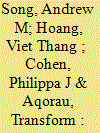

|
|
|
|
|
| Summary/Abstract |
Vietnamese ‘blue boats’ – small wooden‐hulled fishing boats – are now entering the territorial waters of Pacific Island countries and illegally catching high‐value species found on remote coastal reefs. Crossing several international boundaries and traversing a distance of over 5000 km, these intrusions have alarmed Oceanic countries, including Australia. Lacking administrative capacity as well as jurisdictional authority to effectively control the vast stretches of island coastlines individually, governments and intergovernmental bodies in the region have called for strengthened coordination of surveillance efforts while also pressuring Vietnam diplomatically. This paper reviews these latest developments and is the first to provide a focused assessment of the issue. Through the lens of Copenhagen School of securitisation theory, we analyse responses of national and regional actors and their portrayal in online media to understand how blue boats are constructed as a security threat within a narrative of maritime, food and human security. Arguably, Australia together with the Forum Fisheries Agency, who advise on the governance of offshore tuna resources, have so far acted most decisively – in a way that might see them extend their strategic role in the region. We propose a comprehensive empirical research agenda to better understand and manage this nascent, flammable and largely unpredictable inter‐regional phenomenon.
|
|
|
|
|
|
|
|
|
|
|
|
|
|
|
|
| 2 |
ID:
181032
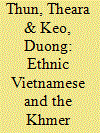

|
|
|
|
|
| Summary/Abstract |
This paper provides insights on the Communist Party of Kampuchea’s (CPK) ethnic policy through the dynamics of its relationship with ethnic Vietnamese in Cambodia during the 1970s. During Cambodia’s civil war between the CPK and the Lon Nol government, the CPK regarded Vietnamese in Cambodia as supporters of its political movement. The paper demonstrates that although class categorization undermined CPK treatment of Vietnamese and other minority groups (notably Chinese and Cham) throughout the four years (1975–1979) of Democratic Kampuchea (DK), internal plots, suspicions of non-Khmer people, and a war with Vietnam led to the expulsion of the vast majority of Vietnamese in 1975. Expulsion gave way to the mass murder from mid-1977 onward of many of the remaining Vietnamese and mixed-parentage children. By demonstrating how CPK notions of class outweighed those of race, the paper argues that CPK purges against Vietnamese should be understood within the framework of CPK efforts to eliminate suspected enemies from Vietnam rather than stemming from genocidal intent.
|
|
|
|
|
|
|
|
|
|
|
|
|
|
|
|
| 3 |
ID:
137812
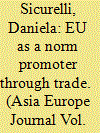

|
|
|
|
|
| Summary/Abstract |
This paper investigates how the external images of the European Union (EU) shape its identity vis-à-vis the USA and focuses on how Vietnamese elites perceive EU-sponsored norms in the context of the ongoing bilateral trade negotiations. The EU emerges as an actor able to export regulatory standards, improve the status of its trade partner within multilateral forums and, at the same time, respect the local ownership of the development process. At the same time, it is criticized for the lack of coherence in its foreign policy, its internal divisions and intrusiveness in Vietnamese domestic politics. Moreover, differences emerge in the way government and non-governmental actors portray the EU, further challenging its univocal representation as a political leader. These perceptions have implications concerning the EU’s ability to export its constitutive principles and values to Vietnam. More broadly, this case study provides insights into the prospects of a future interregional trade agreement with the ASEAN and carries out a critical assessment of the identity and role of the EU as a normative power.
|
|
|
|
|
|
|
|
|
|
|
|
|
|
|
|
| 4 |
ID:
171916


|
|
|
|
|
| Summary/Abstract |
This paper investigates the adaptation processes with reference to the narrative analysis of human–environment interactions in the Vietnamese Mekong Delta. From the political ecology perspective, it focuses on the discourses of the power relationships embedded within the ‘state‐society‐flood’ nexus over the course of its ‘opening‐up and closing‐off’ processes (e.g. excavating large‐scale canals for human settlements and agricultural expansion (opening‐up) and human interventions into natural systems through water control structures (closing‐off)). Drawing on empirical data gathered from 33 interviews and nine focus group discussions in three study areas and relevant literature, the paper argues that human interactions with the flood environments are intertwined with adjustments of adaptation patterns as evidenced through three periods: free adaptation (pre‐1975), transitional adaptation (1976–2010) and forced adaptation (after 2010). These processes have witnessed a gradual power shift in the ‘state‐society’ relations in manipulating floods, which moves from the top‐down towards a more collaborative fashion. By unravelling the political ecology of the ‘state‐society‐flood’ nexus, this paper exhibits the skewed development in the delta, which is largely bound to short‐term development planning to prioritise local socio‐economic and political objectives. The paper contributes important policy implications for achieving socially just and environmentally sustainable development in the delta.
|
|
|
|
|
|
|
|
|
|
|
|
|
|
|
|
| 5 |
ID:
096967
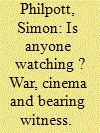

|
|
|
|
|
| Publication |
2010.
|
| Summary/Abstract |
War-on-terror-themed fictional films, particularly those focused on the war in Iraq, have largely failed at the box office and have been subjected to stinging criticism by right-wing political commentators and film reviewers. Critics on the political right have been upset by a perceived lack of patriotism in the films, often arguing that they are dangerous incitements to new acts of violence. However, unlike many earlier war films, including those made about the conflict in Vietnam, directors of films about the war on terror are quite self-consciously making political films that question United States (US) policy and practice, that focus on the effects of war on US service personnel and civilians in Iraq and Afghanistan and that, significantly, attempt to rehabilitate Arabs, Muslims and Islam from decades of Hollywood demonization. Moreover, the films are being made and released into a media environment in which quality news reporting has declined even as the intensity of feeling about 'otherness' has sharpened. This article argues that war on terror film directors are themselves bearing witness to the tragedy of war and thereby inviting film audiences to see the effects of war.
|
|
|
|
|
|
|
|
|
|
|
|
|
|
|
|
| 6 |
ID:
167483
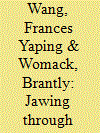

|
|
|
|
|
| Summary/Abstract |
Winston Churchill once said, ‘it is better to jaw-jaw than to war-war.’ However, negotiations are particularly difficult when they are enmeshed in public opinion precommitments. The sharpest crisis between China and Vietnam in the last 30 years concerned the placement of a Chinese oil rig into contested waters in 2014. This study analyses the Chinese and Vietnamese propaganda efforts surrounding the crisis as examples of the instrumental use of propaganda in managing domestic public opinion on diplomatic crises. The article argues that despite very different approaches to public diplomacy during the crisis, both states were primarily concerned with avoiding escalation and ending the confrontation. The authors show how propaganda function as a pacifying device in dealing with rising domestic nationalism when executing a moderate foreign policy.
|
|
|
|
|
|
|
|
|
|
|
|
|
|
|
|
|
|
|
|
|